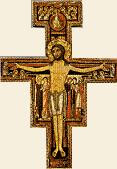 This is the first Lenten season that I am going to observe as a professed Secular Franciscan and a this time I am feeling the spirit of the season with the sudden decrease of text messages from my brothers in the Order.
This is the first Lenten season that I am going to observe as a professed Secular Franciscan and a this time I am feeling the spirit of the season with the sudden decrease of text messages from my brothers in the Order.Texting is an element that is often the easy target for those who wish to do penance during Lent. One simple text message can lead texters into consuming a fortune for plain idle chit-chat. By simply not responding to a text joke or conversation could save a lot for something important. Much more than that, ignoring idle talk through text messaging can save one's soul from sins such as pride and bigotry, anger, hatred.
The silent treatment, however disturbs me, not because they do not respond to my messages, but because, like them I am supposed to be doing penance as well. I have long given up a lot since I had been admitted as a Franciscan - television, malling, movies, eating at my favorite restaurant. I am trying to be kinder, more generous especially towards the poor, loving my enemies, but there are a lot more that need to be done.
The season has just begun. I need to discover what else I need to do and give up (and texting is one of them, thank you.). At the moment, my cellphone is still open to receive messages but remains silent.
















